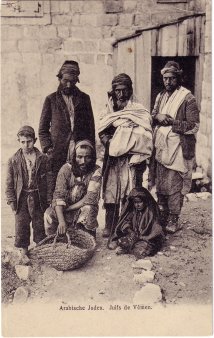
Group of Yemenite Jews, postcard c. 1910
by Salma Ismail, The Yemen Times, June 28
SANA’A, June 28 The death sentence passed on Abdulaziz Al-Abdi, charged with killing Yemeni Jewish and father of nine Masha Al-Nahari last December, heeds mixed reactions among the Jewish community in Yemen.
Despite growing US and Israeli pressure to bring them out of Yemen and settle them in other destinations, the majority of Yemen’s Jews prefer to stay in their ancestral homeland, as long as the government ensures their safety.
Last Sunday’s ruling overturned a previous March sentence that deemed the defendant, a retired pilot in the Yemeni air force, “mentally unstable” and ordered him to pay a “blood fine” of YR 50.5 million, about USD 25,000.
Jews in Yemen are only differentiated from their Muslim counterparts by their well guarded age-old customs, including their traditional dress. For the men, it is the side curls that stand out the most.
“This has nothing to do with religion, it is about justice,” explains Ibrahim Al-Nahari, Masha’s nephew.
“We will stay in our country,” he says adding that to ensure their safety and deter others from carrying out hate crimes the courts should execute the sentence.
“We are Arabs, we are Yemenis, we have nothing to do with the Jews in Israel,” he replies when asked if he would like to immigrate to the US or Israel.
The Jewish Agency for Israel and a coalition of American organizations that includes the United Jewish Communities, New York’s federation, the Hebrew Immigrant Aid Society, and the United Jewish Organizations of Williamsburg have presented attempts to bring Jews out of Yemen as an essential, life-saving operation.
“Only a small number of misinformed people are not tolerant of religions other than Islam,” says Himyar Abdallah, a traffic police officer in Raida. “Most of us treat the Jews here as we would treat any other fellow citizens, with dignity and respect.”
“Reactions over the death sentence vary,” he adds. “While many are pessimistic, others are worried of violent reactions, especially after some people tried to attack the judge that passed the verdict.”
Many Muslim Yemenis do not differentiate between the Jews in Yemen and the Jews that occupy what has come to be known as Israel. During a performance at a recent graduation ceremony in Sana’a, a theatrical play promoting the unity of Yemen depicted a Jewish soldier as the source of conflict between Aden and Sana’a.
Often when tensions rise in Palestine or even in Iraq, the Jews of Yemen bear the brunt of conflict.
Increasing hostilities have prompted a number of Yemenis Jews to leave the country.
The latest three families, two were from Al-Nahari’s family making up a total of 17 people, which arrived in Israel the same day the death sentence was passed.
An estimated 300-400 Jews remain in Yemen, a country where minorities, including the Akhdam, are not very well tolerated.
Although the government boasts support and tolerance to the Jews, it has been slow to fulfill its promise of providing them with safe havens.
President Ali Abdullah Saleh has proposed that the 45 Jewish families in the farming communities of Kharif and the nearby town of Raida in Amran governorate are moved 50 miles southeast to Sana’a, where they can be better protected. He has offered them free plots of land to build homes.
Abraham Yahya, leader of the Jewish community in Sana’a says, “I have been to many countries including the US and Canada, but I love my country.”
The same day a Yemeni appeals court handed a death sentence to Abdul-Aziz Al-Abdi for shooting dead Masha Al-Nahari in December. “All we want is the execution of Allah’s judgment,” he says.
Following threats to the Yemenite Jewish community, the umbrella body of North American Jewish Federation’s plans to evacuate almost half of Yemen’s Jewish community to the US over the next two weeks, according to The Jerusalem Post.
But the Jewish Agency’s Aliya Department director Eli Cohen used the opportunity to call on “all the Jews of Yemen to come to Israel and not to anywhere else in the world,” a reference to the United States.
Zionism is the ideology behind “aliya,” which means the immigration of Jews to the “Land of Israel,” not anywhere else in the world.
Israel defines itself as a Jewish state and offers citizenship to Jews from anywhere in the world, including Yemen, although it continues to refuse the right of return of the Palestinian refugees forced from their homes during the fighting that saw Israel come into existence in 1948.
Freedom of religion and non-discrimination are fundamental principles to strengthening any society. Misinformed community leaders and mosque preachers, promote hatred towards Jews, unbeknownst to them that they are sowing seeds of hatred and discrimination in Yemeni society.
However, not all perceive the Jewish society in Yemen with the same contempt. Religious tolerance is sometimes evident as in the Muslim Charitable Society for Social Welfare when it provided the less fortunate Yemeni Jews in Amran with clothes and gifts for the celebration of Passover in April.
Yemen’s Jews are thought to have roots dating back nearly 3,000 years to King Solomon. The community used to number 60,000 but shrank dramatically when most left for the newborn state of Israel. Today, only an estimated 300-400 remain.